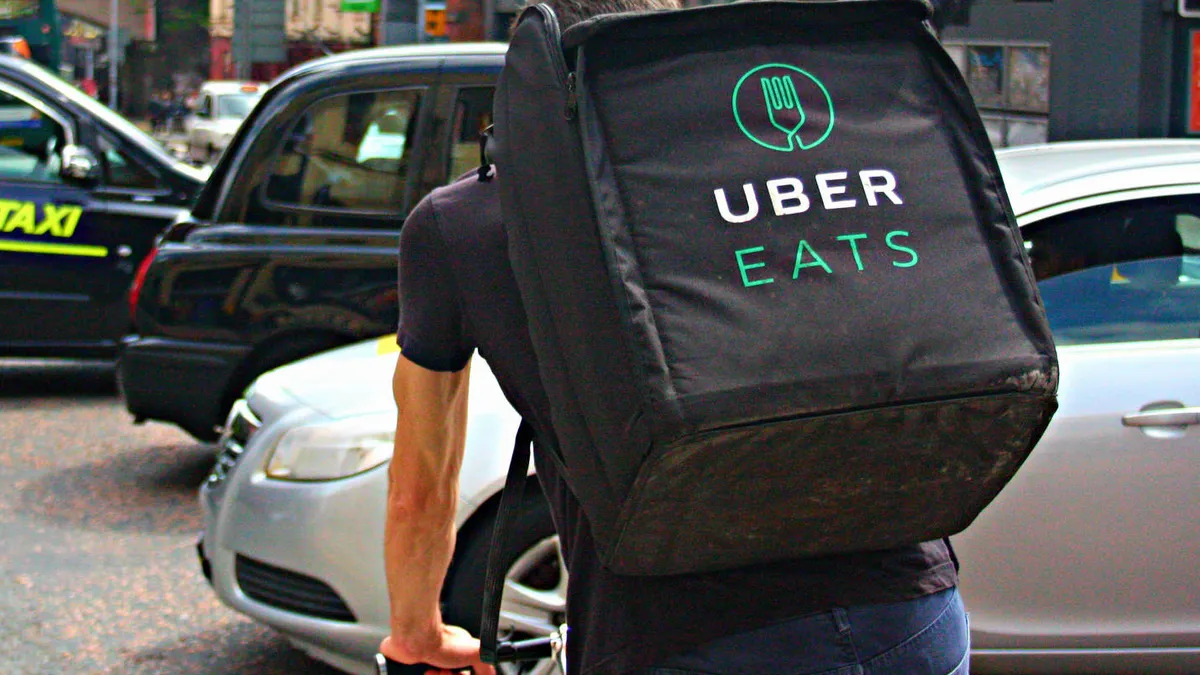Dive Brief:
- The National Restaurant Association released Public Policy Principles for Third Party Delivery on Wednesday that provide best practices for third-party delivery as a guide for lawmakers, according to a press release. This marks the first time restaurants and delivery companies have developed a framework to inform their relationship.
- The seven principles address several factors, including food safety, transparency on fees and contracts, sales tax collection and alcohol delivery.
- These principles, which were developed in partnership with DoorDash, Grubhub and Uber Eats/Postmates, follow a rise in delivery orders due to the pandemic. According to an NRA survey of 1,000 adults conducted Dec. 7 to Dec. 9, 70% said they ordered delivery from a restaurant and 40% used a third-party for delivery.
Dive Insight:
These principles come at an important time, especially with many restaurants quickly pivoting to offering delivery amid dining room restrictions to try and generate revenue. While there have yet to be any nationwide standards for food delivery, lawmakers have been creating piecemeal regulations for the channel, including adding temporary fee caps to keep costs down for restaurants and banning companies from adding non-partner restaurants to platforms.
New York City has been the most aggressive municipality in finding ways to regulate delivery, with a series of six bills introduced to its city council earlier this year that include banning companies from charging restaurants for phone orders that don’t occur and requiring aggregators to disclose costs imposed on restaurants and consumers. While these initiatives have yet to become law, they reflect municipal need to regulate third-party delivery.
NRA's principles are designed to provide guidance and create standards that delivery companies should abide by, and could help ease some of the tension restaurants have had in the past with delivery partners. In the association's survey, about 90% of diners who ordered delivery in the last six months favored each of the seven principles.
"Even before the pandemic, delivery — and decisions related to delivery — had major impacts on restaurant operations," said Mike Whatley, vice president for state and local affairs for the National Restaurant Association. "Until now, the relationship between restaurants and third-party delivery companies lacked a national framework to protect restaurants. … This agreement represents an important first step in an ongoing dialogue between restaurants and third-party delivery companies about ways to improve our relationship going forward."
The seven principles are:
- Restaurants have a right to know and determine when and if their food is delivered.
- Customers should expect the same degree of food safety from delivery as they do when dining in a restaurant.
- Restaurants should be able to offer alcohol to customers through third-party delivery in a safe and legal manner.
- Restaurants deserve transparency on fees (including commissions, delivery fees, and promotional fees) charged by third-party delivery companies.
- Third-party food delivery contracts need contractual transparency, and issues surrounding fees, costs, terms, policies, marketing practices involving the restaurant or its likeness, and insurance/indemnity should be clear.
- Sales tax collection responsibility must be clear in terms of which party is collecting and remitting the specific sales tax to the appropriate authority.
- As a best practice, third-party delivery companies should offer restaurants access to anonymized information regarding orders from their restaurant that originate on third-party platforms.










